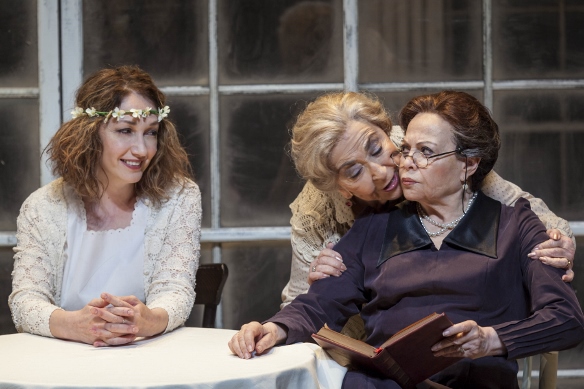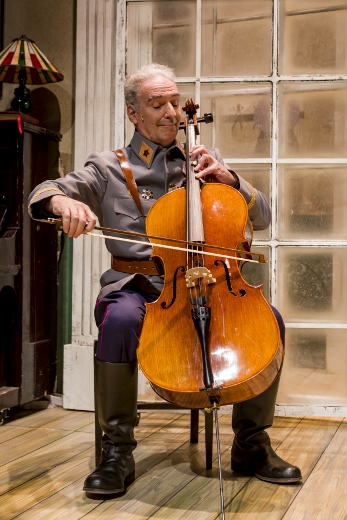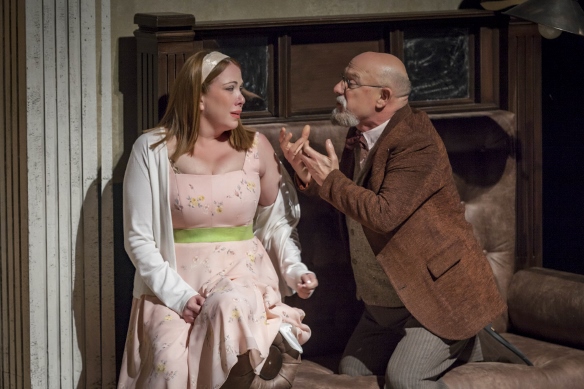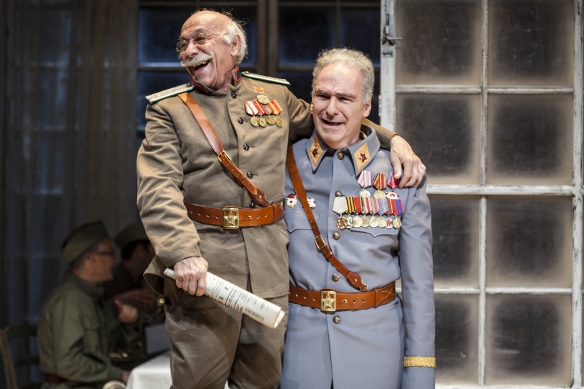
Time has not diminished desire, and dreams shine bright in Hanan Snir’s excellent adaptation of Anton Chekhov’s Three Sisters, that explores the classic play from a different perspective. The original version finds the three sisters all still in their twenties, a year after their father’s death. Snir situates the play twenty years hence, with Olga (Lia Koenig- Stolper), Masha (Gila Almagor-Agmon), and Irina (Evgenia Dodina), moving past middle-age. It’s a daring move, as the play’s central theme is the sister’s desire to be released from the emptiness and monotony of their provincial lives, believing they will find meaning, happiness and fulfillment in Moscow. At twenty-something, despite disappointments, it is still eminently reasonable to dream. What happens to those dreams twenty, thirty, years later? It is a question particularly relevant to our time, when 50-year-olds still have a long future ahead. Encountering the sisters when they are so much older accentuates and enhances Chekhov’s themes; outstanding performances, at once passionate, comic, and poignant, make this a moving theatrical experience.
Suspended in a gossamer daydream of nostalgia and delusions, life encroaches on the three sisters and pins them down, trapped in a glass box, wings stilled. The daughters of a General, Olga, Masha, and Irina, were raised with the comforts, education, and expectations commensurate with their father’s status. Yet after his death, they are left to rely on their own resources. Their accomplishments – knowing languages, playing a musical instrument, are of little use in improving their lives. They have only the regard and affection of the soldiers as consolation, and a constant reminder of their reduced circumstances. Stranded in the provincial town that was the General’s last posting, they yearn to return to Moscow, a Moscow of memories that time and distance have endowed with mythic proportions. If only they were in Moscow, they would be happy, a happiness impervious to all ills, as Masha says: “If I lived in Moscow I wouldn’t mind what the weather was like.”

Music plays a formidable role in this Cameri-Habima co-production. The play opens with a military ensemble marching down the aisles towards the stage, playing a lively tune. The sisters onstage gaze at the soldiers through the window, in a symbolic attitude of expectation. Paulina Adamov’s set design with its moveable transparent window panes is very effective, and gives rise to associations relating to the play’s themes. The music, with its vivacious presence throughout the play, establishes a mood of fun and frolic. Caught up in the small pleasures of the moment, one does not notice that time is passing by, and we have not done what we intended…

The entire cast is impressive: Eli Gornstein as the dashing, sensitive, Vershinin, Rami Baruch as the self-important Andrey who finds his downfall in marrying the young, powerful and vulgar Natasha (Maya Maoz) who manipulates her way to domination, Dov Reiser as the scholarly and kind, yet rather clueless Kulygin, the bitter Solyoni (Oded Leopold) thwarted in love, Chebutikin (Ezra Dagan) who is both comic and pathetic, the ineffectual doctor, and the wonderful Dvora Keidar (alternating with Miriam Gavrieli) as Anfisa, the spirited old servant, who reluctantly makes her way to answer the door, bent but not bowed, cursing all the way.

The three sisters are simply magnificent, compelling one’s attention. Their onstage rapport is so intimate and natural, conveying the sense of sisters who have lived in close quarters for many years, knowing and accepting one another’s foibles. Olga (Lia Koening-Stolper) as the eldest is brimming with warmth and affection, she is the one who takes on the most responsibility, taking in the aged Anfisa. Gila Almagor-Agmon is wonderfully prickly as Masha, providing many comic moments, yet revealing the vulnerabilities of the character, in a poignant and moving manner. As Irina, Evgenia Dodina’s character has perhaps the longest journey in this play. Dressed in white, the youngest, she is the epitome of youthful joie de vivre and idealistic proclamations. As the inexorable passage of time, the slow grind of daily routine, and the vicissitudes of fate take their toll, every nuance of resistance, pain, and suffering is reflected in her visage and gesture. The sisters take us with them, we are with them in their travails and disappointments, we may see ourselves reflected in their hopes, their vanities, their passivity. In the final moments, when so much has been lost, Olga’s words reverberate through the theatre, striking a profound chord as she searches for a glimmer of hope: “what are we living for, why are we suffering… If we only knew, if we only knew!”
Performance dates and times may be found on the Cameri Theatre website. Next performances: June 25 & 26, 2017 at 20:30.
Three Sisters
By Anton Chekhov
Translated, Adapted and Directed by Hanan Snir; Set, Costumes, and Masks: Polina Adamov; Music direction: Yossi Ben Nun; Movement: Miri Lazar; Lighting: Meir Alon; Assistant Director: Karin Sigal; Production Coordinator: Haim Filiba; Cast: Lia Koenig-Stolper – Olga, Gila Almagor-Agmon – Masha, Evgenia Dodina – Irina, Rami Baruch – Andrey, Maya Maoz – Natasha, Dvora Keidar/Miriam Gavrieli – Ansifa, Yigal Sadeh/Mordi Gershon – Tuzenbach, Dov Reiser – Kulygin, Eli Gornstein – Vershinin, Ezra Dagan – Chebutikin, Oded Leopold – Solyoni, Shlomo Vishinsky/Yossi Kantz – Perapont, Tal Weiss – Rode, Ziv Klayer/Koby Zislin – Fedotik, Extras: Christian Sabani, Doriel Zohar; Musicians: Tsviki Moran – French Horn, Shuki Wolfus – Trumpet, Dan Varon – Trumpet, Dudu Buch – Tuba, Luisa Salomon – Trombone.





